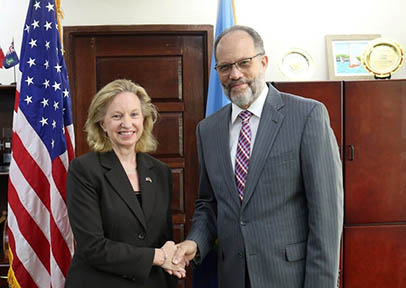CARICOM Secretary-General, Ambassador Irwin LaRocque has expressed the community’s interest in the renewal of legislation for the extension of the Caribbean Basin Trade Partnership Act (CBTPA) and the World Trade Organization (WTO) waiver beyond December 2019 to allow continued duty-free access to the US market.
According to a CARICOM press release, the Secretary-General made the case at an accreditation ceremony for the new US envoy to CARICOM, Sarah-Ann Lynch, at the Secretariat’s Headquarters in Georgetown, Guyana on Tuesday.
The CBTPA was implemented on October 5, 2000, and will expire on September 30, 2020.
LaRocque said the Region also welcomes greater flows of US investments in Agriculture, Tourism and Transportation. He went on to underscore the importance of cooperation in clean and renewable energy, and in security amidst increasing security threats in the current global environment. In that context, the Secretary-General said CARICOM looked forward to collaborating with the United States at the US-Caribbean Security Cooperation Commission in Barbados, and at the Eighth Caribbean-US High-Level Dialogue in Washington next month.
He told Lynch that her country should now be more sensitive to CARICOM’s concerns about blacklisting by the European Union, since the US recently experienced that action itself.
“As we seek to diversify our economies through services, some of our Member States which have developed their financial services sector have been labelled as non-cooperative tax jurisdictions. This is so despite the fact that the countries in question are not designated by the relevant regulatory authorities, such as the Financial Action Task Force and the OECD Global Forum,” the Secretary-General was quoted as saying.
He further stated, “Blacklisted jurisdictions face major reputational damage which has an adverse effect, demonstrated by the ‘de-risking’ strategies of international banks resulting in the withdrawal of crucial correspondent banking relationships. This development has had an impact on investment flows, on trade and on the financial operations of our economies, not to mention impeding the flow of remittances sent by Caribbean nationals living abroad. The US itself has the experience of being recently blacklisted and would therefore be now more sensitive to our situation.”
According to the CARICOM press release, the US envoy in her remarks lauded the structures of CARICOM integration which have, “successfully dismantled barriers to fair trade, and created the formidable Caribbean Court of Justice.”
CARICOM has “impressively coordinated collective approaches to education, public health, disaster response, and development financing,” Lynch stated. She added that the United States is proud to continue to support the work of CARICOM and envisions a Community that “is an innovative and competitive force in the world’s economy.”
The new envoy noted that United States supported and encouraged the single economic space of the CARICOM Single Market and Economy (CSME).
“With this economic integration, we have already seen new opportunities to attract investment and increase economies of scale. We expect to witness an even greater boost in trade, as well as an increased respect for intellectual property rights and consumer protection regulations.”
“We also envision a populace in which every citizen has the opportunity to realise their potential, and contribute to economic, social, and cultural prosperity for themselves and for their society,” the new US envoy stated.
She said as the US strengthens its cooperation with the Region, its Caribbean 2020 strategy provides a framework for focussing US interagency efforts on security, diplomacy, prosperity, energy, education, and health.
She also lauded the successes of the Caribbean Basin Security Initiative which has boosted the capabilities of Caribbean law enforcement and security forces to deter violent crime, reduce the rate of organised crime, and curb illicit narcotics and weapons trafficking.






